RBSE Solutions for Class 12 Maths Chapter 5 Continuity and Differentiability Miscellaneous Exercise
Rajasthan Board RBSE Solutions for Class 12 Maths Chapter 5 Continuity and Differentiability Miscellaneous Exercise Textbook Exercise Questions and Answers.
Rajasthan Board RBSE Solutions for Class 12 Maths in Hindi Medium & English Medium are part of RBSE Solutions for Class 12. Students can also read RBSE Class 12 Maths Important Questions for exam preparation. Students can also go through RBSE Class 12 Maths Notes to understand and remember the concepts easily.
RBSE Class 12 Maths Solutions Chapter 5 Continuity and Differentiability Miscellaneous Exercise
Question 1.
(3x2 - 9x + 5)9
Answer:
Let y = (3x2 - 9 + 5)2
Differentiating both sides wr.t. x
\(\frac{d y}{d x}\) = 9(3x2 - 9x + 5)8 . \(\frac{d}{d x}\) (3x2 - 9x + 5)
= 9(3x2 - 9x + 5)8.(6x - 9)
= 9(6x - 9) (3x2 - 9x + 5)8
= 9 × 3(2x - 3) (3x2 - 9x + 5)8
= 27(2x - 3) (3x2 - 9x + 5)8

Question 2.
sin3 x + cos6 x
Answer:
Let y = sin3 x + cos6 x
Differentiating both sides w.r.t. x
\(\frac{d y}{d x}\) = 3 sin2 x . \(\frac{d}{d x}\) (sin x) + 6 cos5 x . \(\frac{d}{d x}\) (cos x)
= 3 sin2 x cos x + 6 cos5 x (- sin x)
= 3 sin2 x cos x - 6 cos5 x sin x
= 3 sin x cos x (sin x - 2 cos4 x)
Question 3.
(5x)3 cos 2x
Answer:
Let y = (5x)3 cos 2x
Taking logarithm on both sides, we get
log y = 3 cos 2x log (5x)
Now, differentiating both sides w.r.t x
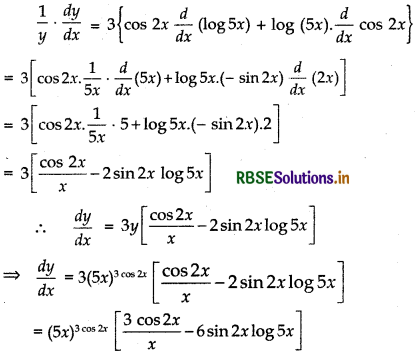

Question 4.
sin-1 (x√x), 0 ≤ x < 1
Answer:
Let y = sin-1 (x√x) ⇒ y = sin-1 (x)3/2
Differentiating both sides w.r.t. x
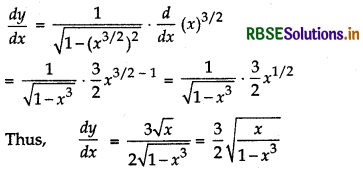
Question 5.
\(\frac{\cos ^{-1} \frac{x}{2}}{\sqrt{2 x+7}}\), - 2 < x < 2
Answer:
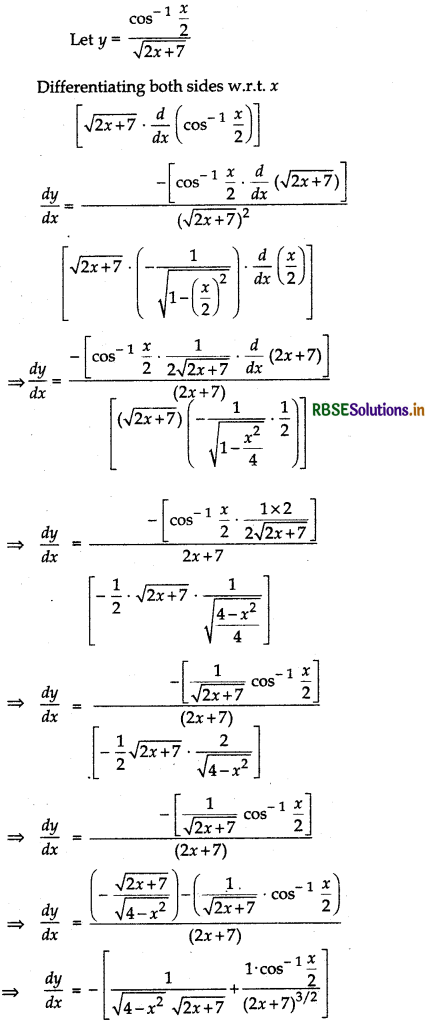

Question 6.
cot-1\(\left[\frac{\sqrt{1+\sin x}+\sqrt{1-\sin x}}{\sqrt{1+\sin x}-\sqrt{1-\sin x}}\right]\), 0 < x < \(\frac{\pi}{2}\)
Answer:
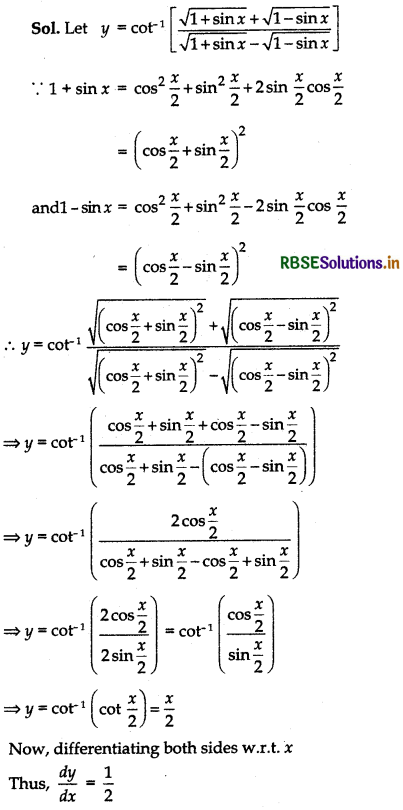
Question 7.
(log x)log x, x > 1
Answer:
Let y = (log x)log x
log y = log x.{log (log x)}
Now, differentiating both sides w.r.t. x
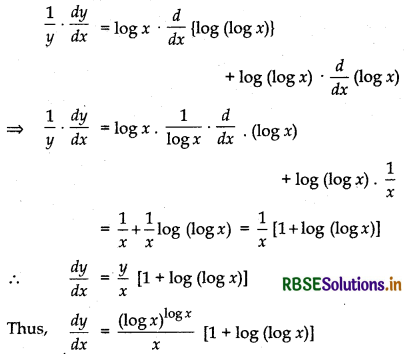

Question 8.
cos (a cos x + b sin x), for some constants a and b.
Answer:
Let y = cos (a cos x + b sin x)
Differentiating both sides w.r.t. x
\(\frac{d y}{d x}\) = - sin(a cos x + b sin x) × \(\frac{d}{d x}\)(a cos x + b sin x)
⇒ \(\frac{d y}{d x}\) = - sin(a cos x + b sin x) × {- a sin x + b cos x}
Thus, \(\frac{d y}{d x}\) = (a sin x - b cos x) × (a cos x + b sin x)
Question 9.
(sin x - cos x)(sin x - cos x), \(\left(\frac{\pi}{4}<x<\frac{3 \pi}{4}\right)\)
Answer:
Let y = (sin x - cos x)(sin x - cos x)
Taking logarithm on both sides
log y = (sin x - cos x) log (sin x - cos x)
Now, differentiating both sides w.r.t. ‘x’
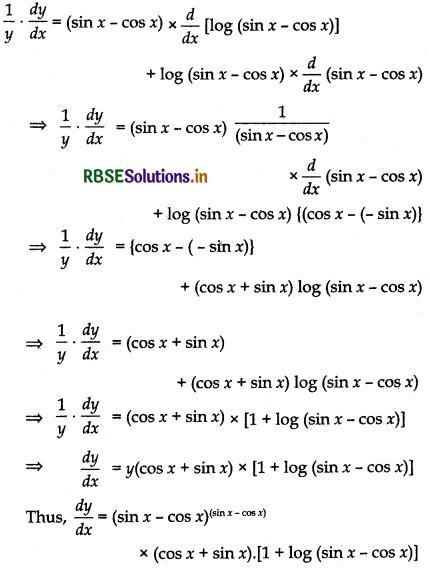

Question 10.
xx + xa + ax + aa, for same fixed a > 0 and x > 0
Answer:
Let y = xx + xa + ax + aa
Differentiating both sides w.r.t. x
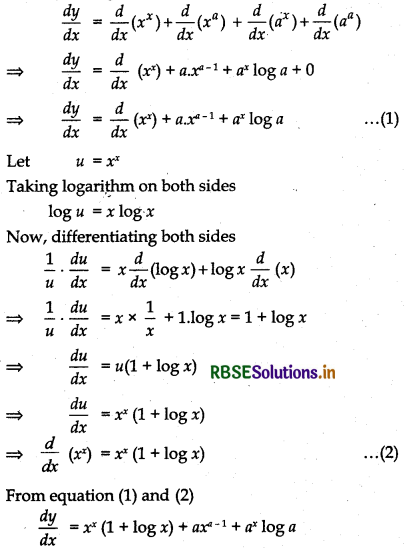
Question 11.
xx2 - 3 + (x - 3)x2 for x > 3
Answer:
Let y = xx2 - 3 + (x - 3)x2
and u = xx2 - 3, y = (x - 3)x2
∴ y = u + v
Differentiating both sides w.r.t. x
\(\frac{d y}{d x}=\frac{d u}{d x}-\frac{d v}{d x}\) ........ (1)
Now, taking logarithm on both sides of u = xx2 - 3
log u = (x2 - 3)log x
Differentiating both sides of w.r.t. x
Now, taking logarithm on both sides of u = xx2 - 3
log u = (x2 - 3)log x
Differentiating both sides of w.r.t. x
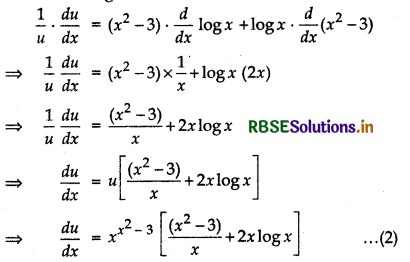
Again, taking logarithm on both sides of v = (x - 3)x2
log v = x2log(x - 3)
Differentiating both sides w.r.t. z
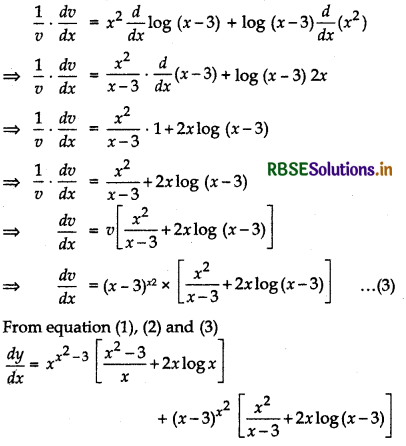

Question 12.
If y = 12(1 - cos t), x = 10(t - sin t), - \(\frac{\pi}{2}\) < t < \(\frac{\pi}{2}\), then find \(\frac{d y}{d x}\).
Answer:
We have,
y = 12(1 - cos t) and x = 10(t - sin t)
Differentiating x and y wr.t. t
\(\frac{d y}{d t}\) = 12{0 - (- sin t)} = 12 sin t
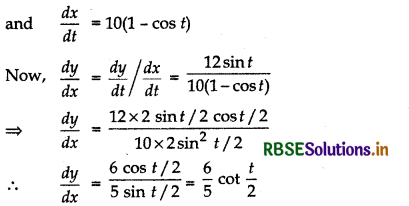
Question 13.
If y = sin-1x + sin-1 \(\sqrt{1-x^{2}}\), 0 < x < 1 then find \(\frac{d y}{d x}\).
Answer:
Given, y = sin-1 x + sin-1 \(\sqrt{1-x^{2}}\)
Putting sin-1 x = θ ⇒ x = sin θ
∴ y = θ + sin-1 (\(\sqrt{1-\sin ^{2} \theta}\))
⇒ y = θ + sin-1 (cos θ)
⇒ y = θ + sin-1 \(\left[\sin \left(\frac{\pi}{2}-\theta\right)\right]\)
⇒ y = θ + \(\frac{\pi}{2}\) - θ ⇒ y = \(\frac{\neq}{2}\)
Differentiating both sides w.r.t. x
\(\frac{d y}{d x}\) = 0
Question 14.
If x\(\sqrt{1+y}\) + y\(\sqrt{1+x}\) = 0 for - 1 < x < 1, then prove that \(\frac{d y}{d x}=-\frac{1}{(1+x)^{2}}\).
Answer:
We have x\(\sqrt{1+y}\) + y\(\sqrt{1+x}\) = 0
⇒ x\(\sqrt{1+y}\) = - y\(\sqrt{1+x}\)
Squaring both sides
(x\(\sqrt{1+y}\))2 = (- y\(\sqrt{1+x}\))2
⇒ x2(1 + y) = y2(1+ x)
⇒ x2 + x2y = y2 + xy2
⇒ x2 + x2y - y2 - xy2 = 0
⇒ x2 - y2 + x2y - xy2 = 0
⇒ (x - y) (x + y) + xy(x - y) = 0
⇒ (x - y) {(x + y) + xy} = 0
⇒ x + y + xy = 0 [∵ (x - y) ≠ 0 or x ≠ y]
⇒ y(1 + x) - x ⇒ y = -\(\frac{x}{1+x}\)
Differentiating both sides w.r.t. x
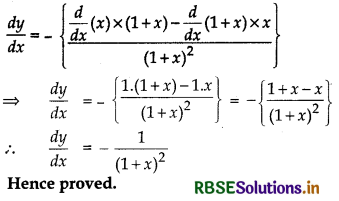

Question 15.
If (x - a)2 + (y - b)2 = c2 for some c > 0, prove that \(\frac{\left\{1+\left(\frac{d y}{d x}\right)^{2}\right\}^{3 / 2}}{\frac{d^{2} y}{d x^{2}}}\), is a constant independent of a and b.
Answer:
We have, (x - a)2 + (y - b)2 = c2 ....... (1)
Differentiating both sides w.r.t. x
2(x - a) + 2(y - b).\(\frac{d y}{d x}\) = 0
⇒ (x - a) + (y - b) \(\frac{d y}{d x}\) = 0 .....(2)
Again, differentiating both sides w.r.t. x
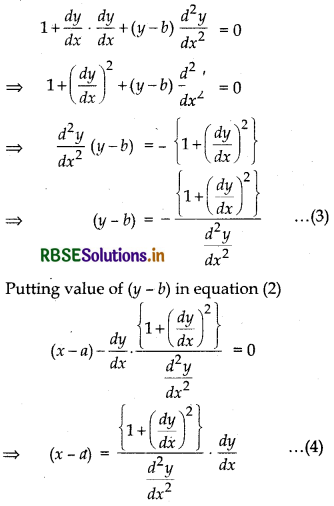
For equation (3) and (4) putting values of (y - b) and (x - a) in equation (1)
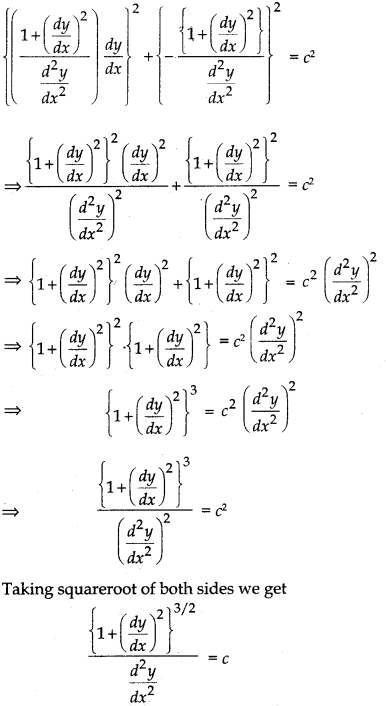
which is independent of a and b.
Hence Proved.
Question 16.
If cos y = x cos (a + y), with cos a ≠ ±1, prove that \(\frac{d y}{d x}\) = \(\frac{\cos ^{2}(a+y)}{\sin a}\).
Answer:
We have, cos y = x cos (a + y)
⇒ \(\frac{\cos y}{\cos (a+y)}\) = x
Differentiating both sides w.r.t. x
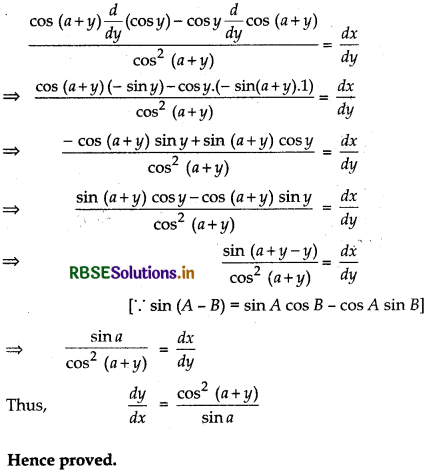

Question 17.
If x = a(cos t + t sin t) and y = a(sin t - t cos t) then find \(\frac{d^{2} y}{d x^{2}}\).
Answer:
We have, x = a(cos t + t sin t)
and y = a(sin t - t cos t)
Differentiating both sides w.r.t t
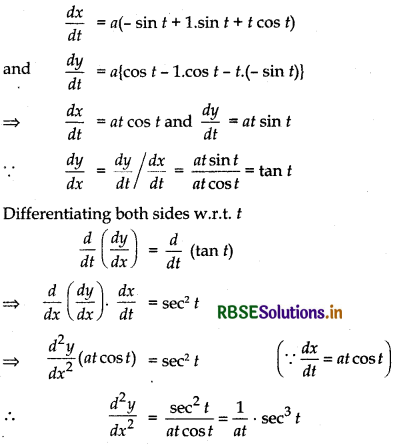
Question 18.
If f(x) = |x|3, show that f”(x) exists for all real x and find it.
Answer:
Let f(x) = x3
If x > 0, |x| = x then f(x) = x3
Differentiating w.r.t. x
\(\frac{d}{d x}\) [f(x)] = \(\frac{d}{d x}\) (x3)
⇒ f'(x) = 3x2
Again, differentiating w.r.t. x
f’(x) = 6x ... (1)
Thus f”(x) exists.
When x < 0, |x| = - x
∴ f(x) = |x|3 = (- x3) = - x3
∴ f(x) = - x3 differentiating w.r.t. x
f'(x) = - 3x2
Again, differentiating w.r.t. x
f''(x) = - 6x ..... (2)
Thus, f”(x) exists
From (1) and (2), we have
f'(x) = 6|x|
Hence, it is proved that f''(x) exists.
Hence proved

Question 19.
Using mathematical induction prove that \(\frac{d}{d x}\)(xn) = nxn - 1 for all positive integers n.
Answer:
We have, \(\frac{d}{d x}\)(xn) = nxn - 1
Let P(n): \(\frac{d}{d x}\)(xn) = nxn - 1
Putting n = 1
P(1): \(\frac{d}{d x}\)(x1) = 1.x1 - 1 = 1.x0 = 1.1 = 1
Thus, given function is true for n = 1 i.e. true for P(1)
Let statement is true for n = k, then
P(k): \(\frac{d}{d x}\)(xk) = kxk - 1
Now, we will prove that statement is true for n = k + 1
P(k + 1): \(\frac{d}{d x}\)(xk + 1) = (k + 1)xk
L.H.S. = \(\frac{d}{d x}\) (xk + 1) = \(\frac{d}{d x}\) (x.xk)
= 1.xk + x.(kxk - 1)
(∵ \(\frac{d}{d x}\)(xk+1) = (k + 1)xk
= xk + k.xk
= xk (k + 1) = (k + 1)xk = R.H.S.
∴ Statement is true for n = k + 1
Thus, by mathematical induction principle, statement is true for positive integer numbers.
Question 20.
Using the fact that sin (A + B) = sin A cos B + cos A sin B and the differentiation obtain the sum formula for cosines.
Answer:
We have
sin (A + B) = sin A cos B + cos A sin B ..... (1)
Let A and B are function of t then differentiating both sides w.r.t. t
\(\frac{d}{d t}\)[sin (A + B)] = \(\frac{d}{d t}\)[sin A cos B + cos A sin Bl
L.H.S. = \(\frac{d}{d t}\)[sin (A + B)]
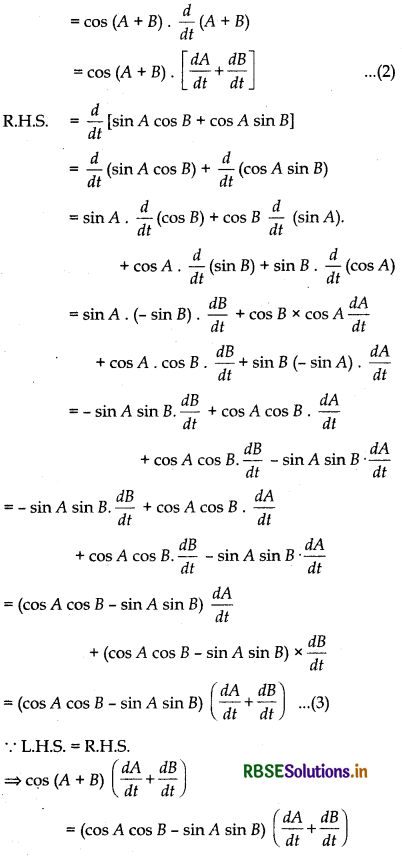
⇒ cos (A + B) = cosA cos B - sin A sin B
Thus, cos (A + B) cos A cos B - sin A sin B

Question 21.
Does there exist a function which is continuous everywhere but not differentiable at exactly two points? Justify your answer.
Answer:
Yes, such function exists which is continuous at each point but not differentiable only at two parts. e.g. function f(x) = |x| + |x - 1|, x ∈ R is continuous at all points but not differentiable at x = 0 and x = 1. Since |x|,is not differentiable at x = 0 similarly |x - 1| is not differentiable at x = 1. Thus, function is not differentiable at two points x = 0, x = 1 whereas it is continuous at all points (where x ∈ R).
Similarly, function f(x) = |x - 2| + |x - 3| x ∈ R, is continuous at all points but not differentiable at x = 2, x = 3.
Question 22.
If y = \(\left|\begin{array}{ccc} f(x) & g(x) & h(x) \\ l & m & n \\ a & b & c \end{array}\right|\), prove that \(\frac{d y}{d x}=\left|\begin{array}{ccc} f^{\prime}(x) & g^{\prime}(x) & h^{\prime}(x) \\ l & m & n \\ a & b & c \end{array}\right|\)
Answer:
We have,
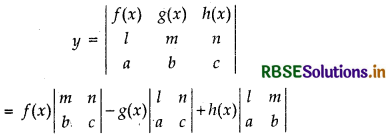
= f(x) (mc - bn) - g(x) (lc - an) + h(x) (lb - am)
⇒ y = (mc - nb) f(x) + g(x) (na - lc) + hx(lb - ma)
Differentiating w.r.t. x
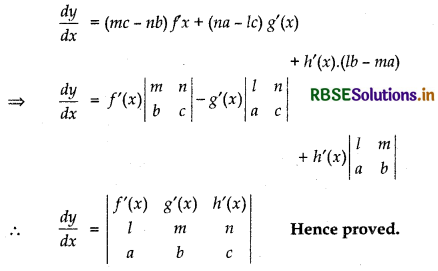
Question 23.
If y = ea cos-1 x - 1 ≤ x ≤ 1, show that
(1 - x2)\(\frac{d^{2} y}{d x^{2}}\) - x\(\frac{d y}{d x}\) - a2y = 0
Answer:
We have
y = ea cos-1 x
Differentiating w.r.t. x
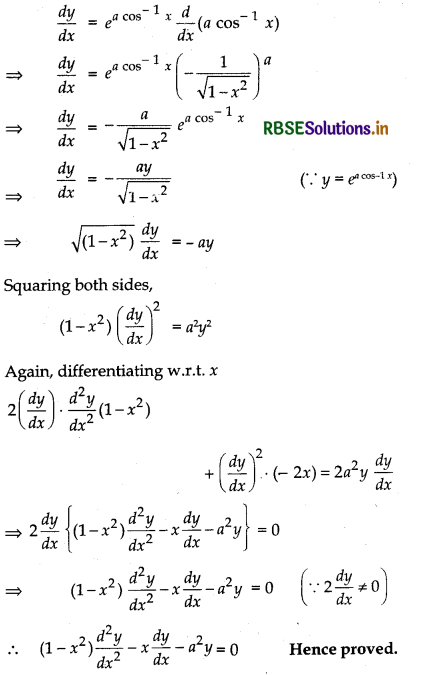

- RBSE Class 12 Maths Notes Chapter 13 Probability
- RBSE Class 12 Maths Notes Chapter 12 Linear Programming
- RBSE Class 12 Maths Notes Chapter 11 Three Dimensional Geometry
- RBSE Class 12 Maths Notes Chapter 10 Vector Algebra
- RBSE Class 12 Maths Notes Chapter 9 Differential Equations
- RBSE Class 12 Maths Notes Chapter 8 Application of Integrals
- RBSE Class 12 Maths Notes Chapter 7 Integrals
- RBSE Class 12 Maths Notes Chapter 6 Application of Derivatives
- RBSE Class 12 Maths Notes Chapter 5 Continuity and Differentiability
- RBSE Class 12 Maths Notes Chapter 4 Determinants
- RBSE Class 12 Maths Notes Chapter 3 Matrices